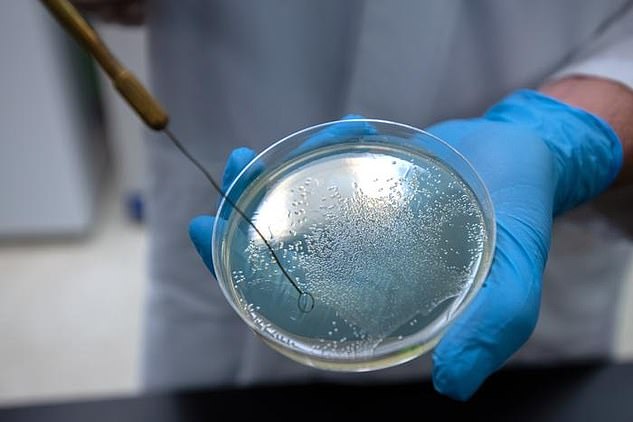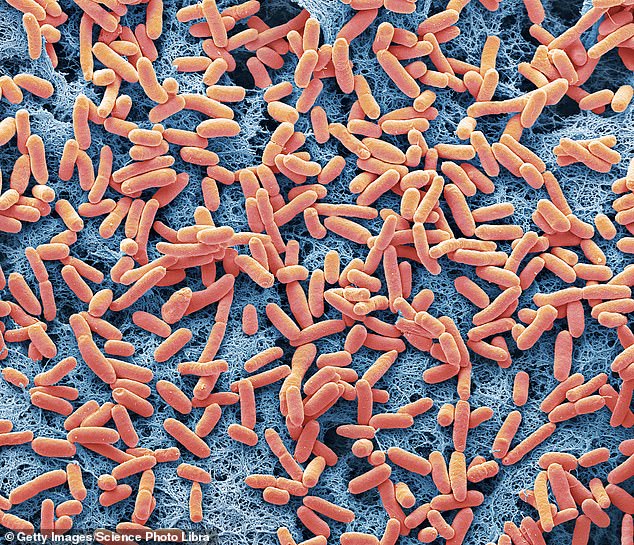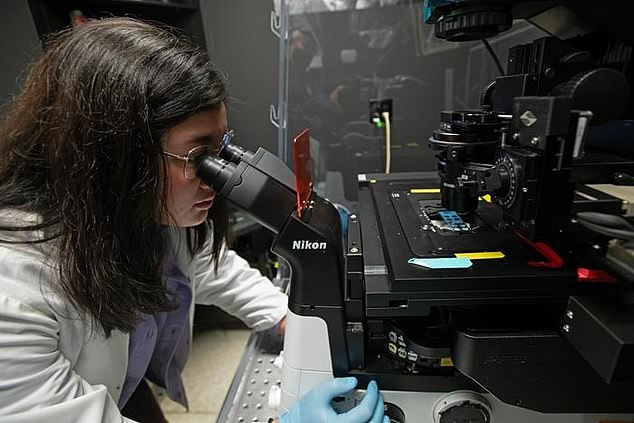- Infectious bacteria make a beeline for blood, just like sharks, a new study found
- Salmonella, E. coli, and related bacteria can detect tiny amounts of blood serum
- READ MORE: Tomato juice could help treat food poisoning, new study suggests
Deadly bacteria of the world have been found to seek and feast on human blood.
Researchers at Washington State University (WSU) uncovered a new trait called ‘bacterial vampirism’ among bacteria like Salmonella and E. coli, which cause foodborne illnesses.
It has long been a mystery to how and why these microorganisms can move so deftly from the gut to the blood where they can be deadly.
The team found that these bacteria are attracted to the liquid part of blood, or serum, which contains nutrients the bacteria can use as food.
The pathogens can easily find where the serum is and enter the bloodstream through small cuts in the digestive system, which sometimes causes death from sepsis in people with inflammatory bowel disease.
Even the tiniest amount of blood is enough to attract vampiric bacteria, much like sharks with their famous ability to detect one drop of blood in 10 billion drops of water.

Washington State University researcher Arden Baylink holds a petri dish containing salmonella bacteria. Baylink and PhD student Siena Glenn have published research showing that some of the world’s deadliest bacteria seek out and eat serum, the liquid part of human blood, which contains nutrients the bacteria can use as food

Bacteria like E. coli can leak into the bloodstream through lesions in the gut of people with inflammatory bowel disease, causing serious complications
Co-author Arden Baylink, a professor at WSU’s College of Veterinary Medicine, said in a statement: ‘Bacteria infecting the bloodstream can be lethal.
‘We learned some of the bacteria that most commonly cause bloodstream infections actually sense a chemical in human blood and swim toward it.’
READ MORE: Suffering from IBD? Why you should try mindfulness
Experts find talk therapies can curb agonizing bowel symptoms.
According to the new study, published in the journal eLife, enterobacteria like E. coli and Salmonella can detect as little as a femtoliter of serum – a tiny quantity equal to 0.0000000000001 milliliters.
Once they find the cut that’s leaking the blood into the gut, they crowd around it and enter it.
It’s a lot like how sharks can search out prey from their blood, but bacteria don’t have noses so they rely on other senses.
The team used a high-powered microscope system to simulate intestinal bleeding by injecting microscopic amounts of human serum and watching as the bacteria navigated toward the source.
They watched as the microbes searched for the serum, finding it took less than one minute.
In this case, it’s a strategy called ‘chemotaxis,’ where bacteria move toward higher concentrations of specific substances.
The team also determined Salmonella has a special protein receptor called Tsr that enables bacteria to sense and swim toward serum.
In the discovery of Tsr, researchers used a form high-resolution microscopy to view the atoms of the protein interacting with serine.

Siena Glenn, a Washington State University Ph.D. student uses a high-powered microscope to study deadly bacteria like E. coli and salmonella
The scientists believe serine is one of the chemicals from blood that the bacteria sense and consume.
This new understanding of how bacteria can home in on the bloodstream paves the way for new drugs that will prevent sepsis before it even happens, rather than treating it once someone is sick, the scientists behind the new study said.
‘By learning how these bacteria are able to detect sources of blood, in the future we could develop new drugs that block this ability. These medicines could improve the lives and health of people with inflammatory bowel disease who are at high risk for bloodstream infections, said Ph.D. student Siena Glenn, a study co-author.
Usually, intestinal infections are resolved by the immune system without serious problems – maybe a touch of diarrhea.
But people who have inflammatory bowel disease, including Crohn’s disease and ulcerative colitis, are at much higher risk of developing bleeds inside their bowel – which can let bacteria enter the bloodstream, causing a more serious bacterial infection.
This puts them at particularly high risk of developing a condition called sepsis, which is essentially a chain reaction of the immune system attacking the body in response to an infection.
Understanding exactly why gut bacteria are adept at entering the bloodstream through tiny tears or cuts in the bowel can help scientists prevent serious illness in people with these chronic conditions.
Under normal circumstances, there are populations of bacteria in our gut that are often considered harmful – like E. coli and salmonella.
They are kept in check by other bacteria and our immune systems when we are healthy.
But if they enter our bloodstream, they can lead to sepsis.
Read more
News Related-
AWS and Clarity AI to use generative AI to boost sustainable investments
-
Ref Watch: 'Enough' of a foul to disallow Man City goal vs Liverpool
-
Day in the Life: Ex-England rugby star on organising this year's Emirates Dubai Sevens
-
Pandya returns to MI, Green goes to RCB
-
Snowstorm kills eight in Ukraine and Moldova, hundreds of towns lose power
-
‘This is why fewer Sikhs visiting gurdwaras abroad’: BJP after Indian envoy heckled in Long Island
-
Inside a Dubai home with upcycled furniture and zero waste
-
Captain Turner aims for Pitch 1 return as JESS bid to retain Dubai Sevens U19 crown
-
No Antoine Dupont but Dubai still set to launch new era for sevens
-
Why ESG investors are concerned about AI
-
Your campsite can harm the environment
-
Mubadala, Saudi Fund deals on US radar for potential China angle
-
Abu Dhabi T10 season seven to kick off with thrilling double-header
-
Eight climate fiction, or cli-fi, books to consider before Cop28
